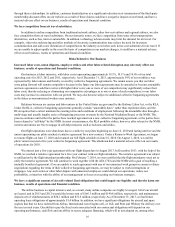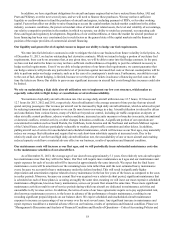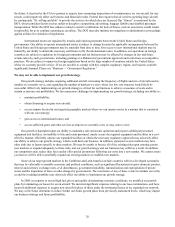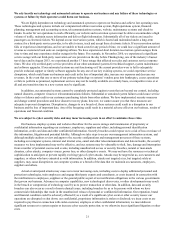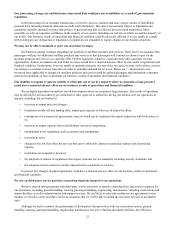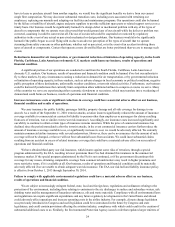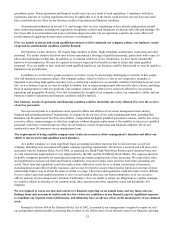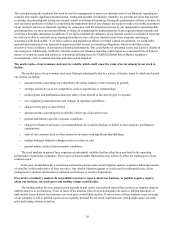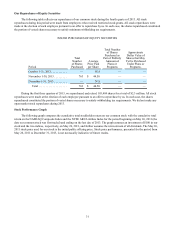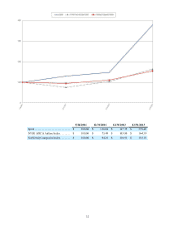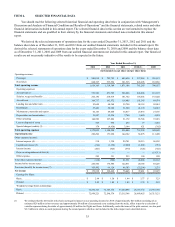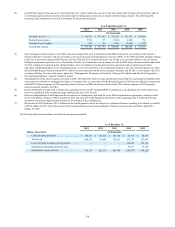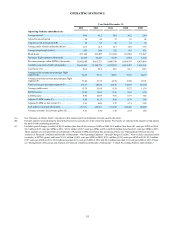Spirit Airlines 2013 Annual Report Download - page 25
Download and view the complete annual report
Please find page 25 of the 2013 Spirit Airlines annual report below. You can navigate through the pages in the report by either clicking on the pages listed below, or by using the keyword search tool below to find specific information within the annual report.25
greenhouse gases. Future operations and financial results may vary as a result of such regulations. Compliance with these
regulations and new or existing regulations that may be applicable to us in the future could increase our cost base and could
have a material adverse effect on our business, results of operations and financial condition.
Governmental authorities in several U.S. and foreign cities are also considering or have already implemented aircraft
noise reduction programs, including the imposition of nighttime curfews and limitations on daytime take-offs and landings. We
have been able to accommodate local noise restrictions imposed to date, but our operations could be adversely affected if
locally-imposed regulations become more restrictive or widespread.
If we are unable to attract and retain qualified personnel or fail to maintain our company culture, our business, results
of operations and financial condition could be harmed.
Our business is labor intensive. We require large numbers of pilots, flight attendants, maintenance technicians and other
personnel. The airline industry has from time to time experienced a shortage of qualified personnel, particularly with respect to
pilots and maintenance technicians. In addition, as is common with most of our competitors, we have faced considerable
turnover of our employees. We may be required to increase wages and/or benefits in order to attract and retain qualified
personnel. If we are unable to hire, train and retain qualified employees, our business could be harmed and we may be unable to
implement our growth plans.
In addition, as we hire more people and grow, we believe it may be increasingly challenging to continue to hire people
who will maintain our company culture. Our company culture, which we believe is one of our competitive strengths, is
important to providing high-quality customer service and having a productive, accountable workforce that helps keep our costs
low. As we continue to grow, we may be unable to identify, hire or retain enough people who meet the above criteria, including
those in management or other key positions. Our company culture could otherwise be adversely affected by our growing
operations and geographic diversity. If we fail to maintain the strength of our company culture, our competitive ability and our
business, results of operations and financial condition could be harmed.
Our business, results of operations and financial condition could be materially adversely affected if we lose the services
of our key personnel.
Our success depends to a significant extent upon the efforts and abilities of our senior management team and key
financial and operating personnel. In particular, we depend on the services of our senior management team, including Ben
Baldanza, our President and Chief Executive Officer. Competition for highly qualified personnel is intense, and the loss of any
executive officer, senior manager, or other key employee without adequate replacement or the inability to attract new qualified
personnel could have a material adverse effect on our business, results of operations and financial condition. We do not
maintain key-man life insurance on our management team.
The requirements of being a public company may strain our resources, divert management’s attention and affect our
ability to attract and retain qualified board members.
As a public company, we incur significant legal, accounting and other expenses that we did not incur as a private
company, including costs associated with public company reporting requirements. We also have incurred and will incur costs
associated with the Sarbanes-Oxley Act of 2002, as amended, the Dodd-Frank Wall Street Reform and Consumer Protection
Act and related rules implemented or to be implemented by the SEC and the NASDAQ Stock Market. The expenses incurred
by public companies generally for reporting and corporate governance purposes have been increasing. We expect these rules
and regulations to increase our legal and financial compliance costs and to make some activities more time-consuming and
costly. These laws and regulations could also make it more difficult or costly for us to obtain certain types of insurance,
including director and officer liability insurance, and we may be forced to accept reduced policy limits and coverage or incur
substantially higher costs to obtain the same or similar coverage. These laws and regulations could also make it more difficult
for us to attract and retain qualified persons to serve on our board of directors, our board committees, or as our executive
officers and may divert management’s attention. Furthermore, if we are unable to satisfy our obligations as a public company,
we could be subject to delisting of our common stock, fines, sanctions and other regulatory action and potentially civil
litigation.
We are required to assess our internal control over financial reporting on an annual basis, and any future adverse
findings from such assessment could result in a loss of investor confidence in our financial reports, significant expenses
to remediate any internal control deficiencies, and ultimately have an adverse effect on the market price of our common
stock.
Pursuant to Section 404 of the Sarbanes-Oxley Act of 2002, as amended, our management is required to report on, and
our independent registered public accounting firm to attest to, the effectiveness of our internal control over financial reporting.



